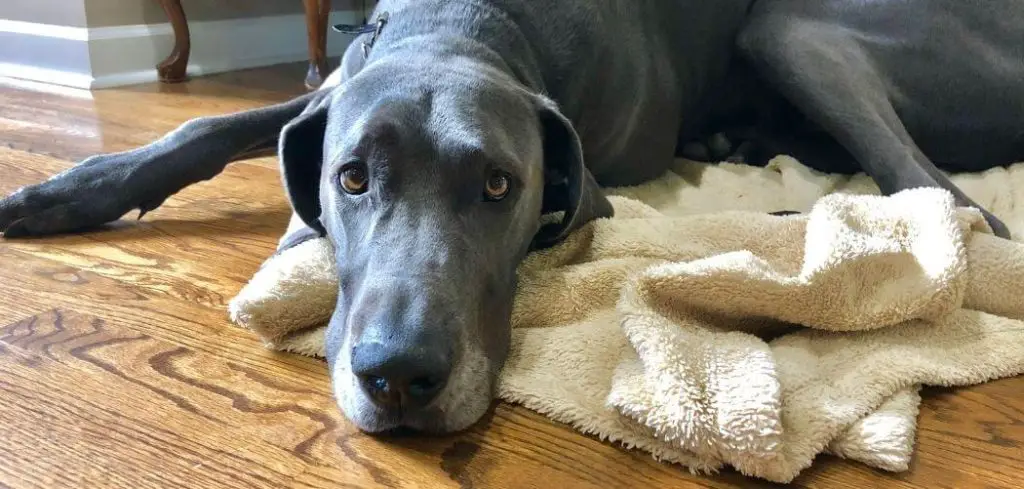Seeing your senior dog urinate indoors can be both frustrating and concerning. When an old dog keeps peeing in the house, it may indicate underlying health problems.
We outline the common reasons why an old dog may keep peeing in the house, what you can do, and when to seek veterinary help.
Old Dog Keeps Peeing in House — Why It Happens
An old dog that keeps peeing in the house is often showing signs of aging-related health or behavioral changes. Common causes include urinary tract infections, kidney disease, diabetes, weakened bladder control (incontinence), or cognitive decline that affects their ability to remember house training. Stress, anxiety, or changes in routine can also contribute.
While occasional accidents may be managed with more frequent bathroom breaks, waterproof bedding, or dog diapers, persistent or sudden changes always warrant a veterinary check to rule out serious health issues.

Old Dog Keeps Peeing in The House: Common Causes
Urinary Tract Infections
Urinary tract infections (UTIs) are a frequent cause of sudden accidents in older dogs.
Dogs may feel an urgent need to urinate but struggle to reach their usual spot, leading to indoor accidents.
Other signs include frequent licking of the genital area, discomfort, or blood in the urine. UTIs are treatable with veterinary care, but left untreated they can cause more serious kidney complications.
Read more: Old Dog Peeing in House: Time to Put Them Down?
Age-Related Incontinence
As dogs age, the muscles controlling the bladder can weaken. Older dogs may dribble urine, have accidents shortly after being outside, or fail to hold urine overnight.
Incontinence is not only inconvenient but may also lead to skin irritation or infection if unmanaged. Management may include medications, bladder support, or lifestyle adjustments.
Kidney or Bladder Disease
Chronic kidney disease or bladder issues can increase urination frequency. Signs include excessive drinking, increased urine volume, or sudden accidents in previously house-trained dogs.
Early veterinary intervention is important to prevent progression and manage symptoms effectively.
Arthritis or Mobility Challenges
Arthritis and joint pain can make it difficult for senior dogs to reach outdoor elimination spots.
Dogs may avoid stairs or long walks, leading to accidents indoors. Recognizing mobility limitations and providing easier access to elimination areas can reduce stress and improve comfort.
Cognitive Dysfunction
Cognitive dysfunction syndrome (CDS) can affect an older dog’s awareness of where to urinate.
Disorientation, forgetfulness, or confusion may result in indoor accidents even in well-trained dogs.
Other signs may include altered sleep patterns, anxiety, and changes in interaction with family members. Supportive care and routine adjustments can help manage these behaviors.
Dietary or Medication Changes
Sudden changes in diet or new medications may affect bladder function. You may notice increased urination frequency or accidents shortly after food transitions or starting medications.
Gradual changes and monitoring for reactions can prevent indoor accidents and ensure comfort.
What to Do If Your Old Dog Keeps Peeing in The House
Observe your dog’s urination patterns and note timing and frequency.
Maintain a consistent feeding schedule and provide frequent opportunities for outdoor elimination.
Consider using indoor potty pads or accessible outdoor areas if mobility is limited.
Keep a low-stress environment to reduce anxiety-related accidents.
Consult your veterinarian before introducing new diets, medications, or supplements, as underlying health conditions may require professional guidance.
When to Call or Visit Your Vet
Seek veterinary attention immediately if your dog has blood in the urine, straining to urinate, or shows signs of pain or lethargy.
Frequent indoor accidents combined with excessive thirst, vomiting, or behavioral changes warrant prompt evaluation.
Your veterinarian can run diagnostic tests to detect UTIs, kidney disease, incontinence, or cognitive issues and recommend an appropriate treatment plan.
Read more: Senior Dog Incontinence (Practical tips for owners)
Key Takeaway
Frequent indoor urination in older dogs often reflects medical conditions, age-related changes, or mobility challenges. Monitoring patterns, providing accessible elimination options, and maintaining a structured routine can help manage accidents at home.
Veterinary evaluation is crucial to identify underlying causes and provide effective treatment. With attentive care, your senior dog can remain healthy, comfortable, and happy while minimizing indoor accidents.
